Have you ever tried to send a PDF but weren't able to do so because of its weight? Does this sound familiar? Then you may be wondering, "Why is my PDF file so large?"
By understanding the reason why your paper is big and taking steps to shrink PDF file size, you'll find it simple to distribute them to others online without any issues. In this article, we'll explain the causes and explore 4 effective ways to make a PDF smaller.
Solution 1. Compress PDF
Let’s get straight to the point—if your PDF is huge and lagging, squeeze it to streamline both download and sharing. Condensation essentially eliminates redundant structures, resulting in lightened draft and more productive data handling on both ends.
In practical terms, minimization regularly yields better-than-expected results, with reductions up to 50%.
Guide on shrinking PDF file size using a PDF compressor:
- Access the online PDF reducer and click "Add File(s)" to upload your document. Sources can include local devices, Google Drive, or Dropbox.
- Determine settings. "Recommended" preserves visual fidelity, whereas "Maximum" encodes the size more.
- Press "Compress" and allow the process to complete.
- Download the newly created draft. Alternatively, opt for cloud storage or generate a direct sharing link for distribution.
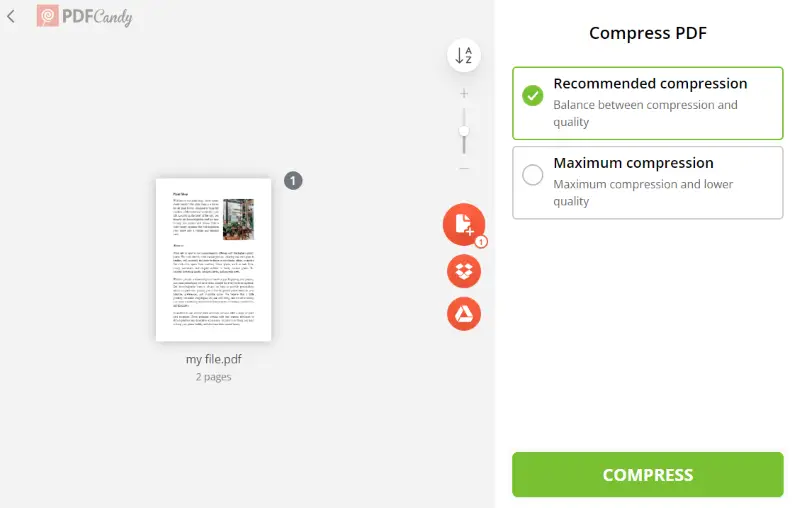
Pros:
- Adjustable balance between compaction level and output quality.
- Batch processing supported for increased workflow efficiency.
- Completely browser-based—no additional installations required.
- Temporary secure storage (2-hour retention window).
- Responsive customer support for technical queries or troubleshooting.
- Integrated instruments for further customization: Edit PDFs or change them to different extensions.
PDF Candy's utility is robust and streamlined for technicians seeking efficiency without sacrificing data integrity—no need to remove elements or compromise critical content.
Solution 2. Split PDF into pages
If maintaining your PDF’s original layout is a priority, splitting it into smaller sections is the most reliable approach. By breaking up a large paper into manageable segments, you avoid encoding loss altogether.
How to minimize the size of a PDF file:
- Upload the PDF to the online PDF splitter from your device or cloud storage.
- Configure settings. Divide the document by page ranges, into single papers, and merge/delete selected pages based on your requirements.
- Press the "Split PDF" command.
- Download each separate PDF individually, or as a ZIP archive. There are also choices to save directly to cloud storage, employ a link, or retrieve via QR code to a mobile device.
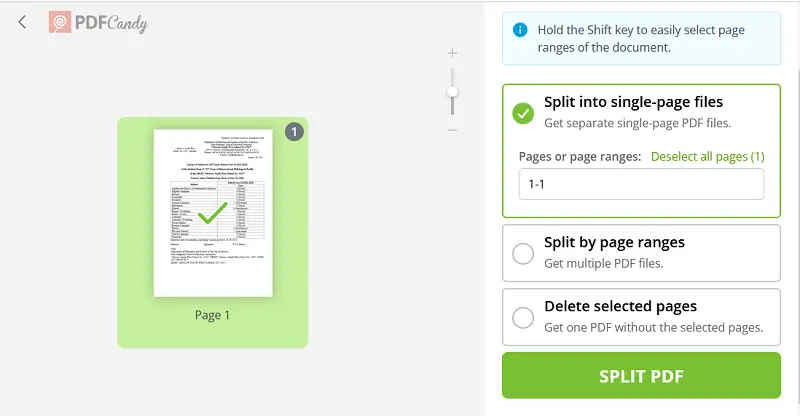
Pros:
- Remove unnecessary pages to optimize the material.
- Share targeted blocks rather than the entire doc.
- Print only the pages needed.
- Improves navigation and accessibility.
- Streamlines management.
- No need for additional software or plugins.
Cons:
- Can only process one PDF at a time; batch operations require repeated manual actions.
Utilizing this function is recommended when integrity matters. It prevents quality degradation while enabling straightforward organization. If needed, further modifications—like rearranging pages—can be executed on output.
Solution 3. Make PDF smaller by resizing it
If your PDF is eating up too much storage or struggling to upload, then reduce PDF size without tanking the quality. There’s an accessible online resizer for precisely this need—it’s direct, and you don’t need special training.
Step-by-step guide on shrinking the PDF:
- Choose the document from your device, Dropbox, or Google Drive and upload it to the free PDF resizer.
- Select the desired dimensions (US Letter, A3, A4, or A5).
- Click "Resize" The tool processes file compression and page resizing automatically.
- Obtain the end and store it on your device.
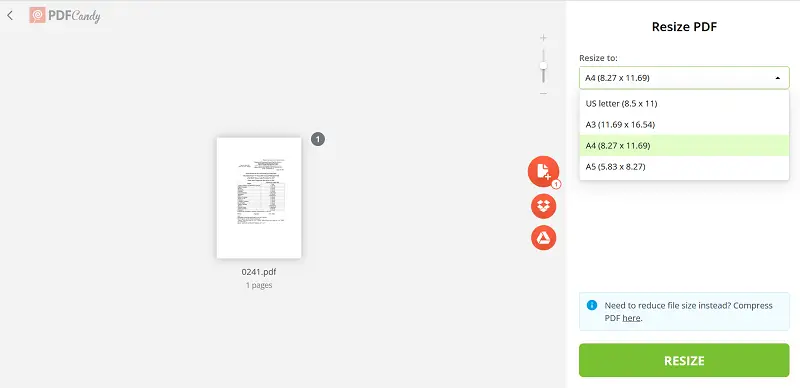
Pros:
- Change the page format of non-standard-sized content.
- Optimize multiple files at once.
- User-friendly GUI enables fast learning curve.
- Fast PDF resizing with excellent quality results.
- Output settings can be fine-tuned.
- Implements robust data encryption for defense.
Cons:
- Inflexible for materials requiring specific, unchangeable measurements.
In summary, this resizing tool is an effective option—letting you cut down size, adjust dimensions, and maintain handling of your sensitive contracts.
Solution 4. Compress PDF with an archiver
If you are working with a very extensive PDF, one practical way to reduce is to minify them into an archive. 7-Zip is a widely known, open-source utility that supports multiple formats.
How to use a free archiver to shrink PDF file size:
- Download and install the app from the official website.
- Navigate to your PDF, right-click it, choose "7-Zip", and pick "Add to archive...".
- Select the format (7z, ZIP, etc.) and the level (higher yields smaller files).
- Set a password if you want to protect your data.
- Click "OK" to begin zipping. The new version will appear in the same folder as your original PDF.
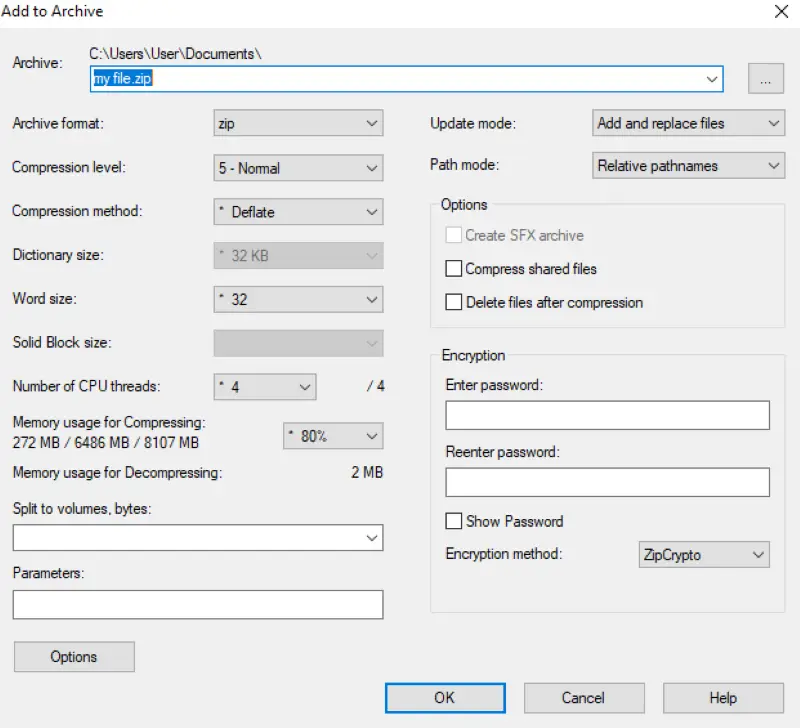
Pros:
- PDF ratios of up to 10 times smaller than other formats.
- Option to include password protection for enhanced security.
Cons:
- Processing time can vary depending on the settings.
- If you send an archived file to another user, they have to apply an archiver to open the item.
- Direct editing isn’t possible within the archive; extraction is required for modifications, followed by recompression.
Utilizing 7-Zip for condensing PDFs can be advantageous, as it can decrease the size while preserving quality and data security. However, the reducer comes with some drawbacks, such as inconvenience and compatibility issues.
But why is my PDF file so large?
This is a frequent issue when transmitting PDF. Typically, the primary factors are rooted in the structure and elements embedded within the PDF.
PDF files integrate multiple types of content: text, images, vector graphics, and sometimes embedded fonts or annotations. All these items collectively impact the final size, and optimization at each step is crucial for management.
- Images
High-resolution pictures (JPG, PNG, TIFF, etc.) take up a ridiculous amount of space. Even a small-looking photo can inflate a PDF like crazy if it’s high-res. If your PDF has full-page color footage, intricate diagrams, or screenshots, expect the size to jump.
Pro tip: reducing your visuals' resolution—or swapping raster for vector graphics—can make a massive difference. If you need to batch-resize or optimize, you can always extract the images first, fix them up, and reinsert them.
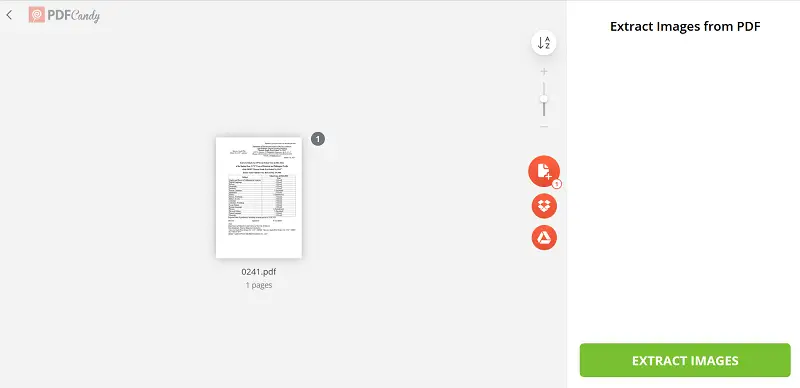
- Type
What you convert really does matter. Saving a PDF directly from a Word or DOC usually produces a much smaller compared to exporting from a JPG or PNG. Pictures are data-heavy—plain and simple.
- Software version
Older editions of PDF-generating software tend to do a worse job at compressing. The algorithms aren’t as good, and you might end up with loads of unnecessary overhead. It’s not just a theory—files from older Word or Acrobat get noticeably larger than ones from newer releases.
Overall, several factors can affect a large document size in PDF format. By understanding how each element affects the overall weight, you can take action to lessen it. This will help you to make sure that it doesn't take too long for others to download and view it.
How do I reduce the size of a PDF without losing quality?
If you're handling a voluminous PDF and don't want to lose any of its quality, there are a few choices available.
- Convert to other formats. Try exporting the PDF to something like Word or Excel. Those extensions usually eat up less disk space, which is handy when storage is tight.
- Leverage built-in optimization tools. Most mainstream PDF readers, like Adobe Acrobat or Foxit, have compression features. These let you shrink your file with minimal loss in fidelity—pretty efficient, honestly.
- Lower image resolution. If your PDF contains large images, consider flattening their quality. This will help reduce the total size of your document without sacrificing much visual fidelity.
- Eliminate unnecessary content. Scan through your PDF and cut PDF pages or unwanted objects. That could be stray annotations, redundant text boxes, or random shapes—no need to keep dead weight.
Tips on how to avoid creating a large PDF
- Use vector graphics. Vector-based graphics instead of raster-based graphics can help to reduce file size.
- Remove fonts. Some fonts can add a lot to the volume, so eliminating them can squash the dimension.
- Apply default settings when creating PDFs. By utilizing the standard preferences when generating a PDF, you can guarantee that superfluous components are not included in the record. This prevents making a PDF too large.
FAQ
How do comments impact PDF size?
Annotations, especially if extensive, add to the file . Removing unnecessary comments or flattening them into the document can pack the weight.
Does saving a PDF as a reduced-size file work?
Yes, most editors have an option to save or export as a reduced-size PDF. This feature typically compresses images, removes unnecessary data, and optimizes PDF.
Are vector graphics more practical for PDFs than raster images?
Vector images are often more efficient than high-resolution raster pictures because they are defined by mathematical equations rather than pixels. This leads to smaller file sizes. However, very complex vector graphics can still increase PDF.
Why are scanned documents often large PDFs?
This is because they capture high-resolution images of physical pages, which result in large papers. You can reduce the size by scanning at a lower resolution or using OCR to convert the pictures into text-based PDFs.
How does PDF version or compatibility level affect size?
Saving docs for older versions (e.g., PDF 1.3) can increase PDF, since features like object compression and advanced image encoding aren't supported. Newer standards (like PDF 1.7 or PDF/A) allow more systematic structure and methods, such as object streams and JBIG2 for monochrome pictures.
Conclusion
As you can see, reducing the PDF document size can be surprisingly straightforward. By adhering to the directions in this article, you can successfully minimize your PDF. It is possible to do so while preserving the quality and important data content.
Now you know how to compress PDF . This will help you keep your drafts organized and allow you to share them more easily than ever before!
After encoding your PDF, you can use other instruments to work on it:
- Edit PDF with a powerful set of tools.
- Add password to your PDF.


.webp?w=420&h=184)

